Steve Hoffman and Eric Hayashi are certainly well-rounded interactive entertainment executives. Their bios are full of so many impressive entertainment and gaming companies that it will make your head spin. Combined, Steve and Eric have worked at Vivendi Universal Games, Zannel, Kayak Interactive, Virgin Interactive, Infospace, Spiderdance, R/GA Interactive, Chasma Interactive, BAP Interactive, LavaMind, Hasbro Interactive, Sega and Atari.
Table of Contents[Hide][Show]
- Let’s say you are in an elevator with some venture capital bigwig. In a nutshell, how would you describe ROCKETON? What’s your ROCKETON “elevator pitch”?
- How did you pick the name “ROCKETON”? What exactly does ROCKETON mean?
- Did you know that “ROCKETON-Electro Flow” is a sub musical genre of Reggae?
- Before settling on the name ROCKETON, what were some of the names you rejected?
- We looked up the domain history for rocketon.com and it looks like the name was available and you didn’t have to buy it from an existing owner. Was this a major factor in the name selection for ROCKETON?
- Eric’s handle on ROCKETON is “Big Kahuna.” Is that a nickname of his? Does everyone at the office call Eric “Big Kahuna” at work?
- The ROCKETON plug-in works for both Firefox and Internet Explorer. What’s your personal browser(s) of choice?
- Let’s talk about some of ROCKETON’s features. As ROCKETON avatars travel around the Internet, what types of interactive experiences should they expect to encounter?
- The chat feature in ROCKETON doesn’t function exactly like traditional IM programs such as AIM or iChat. You briefly went into this on the ROCKETON blog but can you expand on that a little more here? What are the innovative elements of social interaction that ROCKETON has added to the chat feature?
- Who came up with the graphic design style of the ROCKETON avatars and virtual goods?
- Speaking of virtual goods, can avatars make money? What’s ROCKETON’s business model?
- Would you even sell ROCKETON avatar activity and traffic data to advertisers?
- You’ve scattered virtual items and prizes all over the Internet. For example, Coca-Cola’s website has a vending machine for ROCKETON users that dispenses soda cans users can add to their inventory. Is this vending machine a paid marketing message by Coca-Cola? What other companies have already signed sponsored ‘brand interaction’ deals with ROCKETON?
- Legally, do you need permission before placing an item on top of someone’s web site? For example, Microsoft would probably get upset if you put an iPhone on the Zune homepage.
- There are all sorts of virtual goods in the ROCKETON “My Stuff” folder that can be either purchased with Rocket Dollars or by trading in ROCKETON points that players earn online. Do you have plans to monetize the ROCKETON “My Stuff” folder with sponsored products like Facebook has done with their sponsored gifts?
- What exactly are “Rocket Dollars”?
- What’s the most popular paid item currently in the ROCKETON store? Most expensive item Points/Rocket Dollars?
- How do you decide on whether or not an item can be purchased with Rocket Dollars or Points?
- A February 2008 ROCKETON press release announced that investment firm D.E. Shaw had invested $5M into the future of ROCKETON. What other venture capital firms have invested in ROCKETON? Would you ever consider letting your users possibly invest in the company?
- Would you consider creating custom ROCKETON avatars for online celebrities, like Perez Hilton, that they could use on their blogs to interact and chat with their fans?
- What were some of the big name projects you guys oversaw in your previous roles before co-founding ROCKETON?
- You’ve probably been keeping a close eye on the launch of Justin Hall’s PMOG service. Although both of your products differ greatly, they both are basically Firefox web browser extensions that turn mundane daily web browsing into a multiplayer online game. Is there room for both PMOG and ROCKETON on the Internet?
- Last month my browser almost had a heart attack when I found myself playing PMOG, ROCKETON and engaged in Balloonacy, Orange’s Internet balloon race, all at the same time. Is there enough room on the average computer monitor for ROCKETON and your competitors?
- When describing ROCKETON to my coworkers, the phrase “Second Life killer” came up several times. What’s your initial reaction when you hear someone describe ROCKETON as a “Second Life killer”?
- When PMOG first launched, it was plagued by users of click-spam sites like MyMiniCity. What precautions has ROCKETON taken to protect itself from users trying to abuse the system?
- Once a user has a ROCKETON avatar, their avatar can do a variety of things online with other avatars including play games, chat, travel to other web sites or even go on a date. Are you worried about things like adults trying to lure younger players to porn sites or pedophiles engaging in private sexual chats with underage ROCKETON users?
- Let’s talk about the future of ROCKETON. We noticed that ROCKETON doesn’t even have a Wikipedia page yet. Is that still on your ‘to do list’? I know you’re a young company and all, but you’ve already gotten your TechCrunch mention.
- Sometimes success can be a double-edged sword. Twitter for example goes down so often that someone created a web site calledIsTwitterDown.com. PMOG also frequently goes down as they continue to scale up their servers. Do you have a plan to try to maximize your uptime with ROCKETON after the site comes out of beta?
- Does ROCKETON have a limit on how many users are displayed per page? For example, what happens if Apple announces a new iPhone and 500k ROCKETON users all visit Apple.com at the exact same time? Will avatars for all 500k users be on the same page at the same time? That might make it hard to read anything on the screen.
- Are there any plans to open up the ROCKETON API like Facebook did and allow 3rd party developers to create interactive elements like the Coca-Cola vending machine?
- Have you thought about taking ROCKETON beyond being just a browser plug-in? Maybe make a ROCKETON Facebook app or a desktop widget?
- Right now (June/July 2008) ROCKETON is still in closed alpha. When do you expect to launch the service to the general public?
- If someone is reading this right now and not already registered on ROCKETON, what message would you want to leave them with? Why should they join the ROCKETON community?
So what did Steve and Eric do with all that experience? What was the culmination of this vast interactive knowledge? In 2007, Steve Hoffman and Eric Hayashi joined forces with Naomi Kokubo and co-founded ROCKETON, a new type of multiplayer social experience that spans the entire web. Instead of having to go to a separate site or use a specific application like Second Life, ROCKETON turns the entire Internet into a virtual world for browser based avatars. ROCKETON is Second Life + PMOG with a twist of Facebook and a dash of StumbleUpon. It’s a Web 2.0 evolutional twist on virtual reality.
We were lucky enough to get some time with Steve and Eric and grilled them pretty hard about ROCKETON. The full interview is below. Enjoy.
Let’s say you are in an elevator with some venture capital bigwig. In a nutshell, how would you describe ROCKETON? What’s your ROCKETON “elevator pitch”?
ROCKETON is a parallel virtual world. This is a term Steve Hoffman (ROCKETON co-founder) coined when we did our first press release, so we’ll explain what we mean. A parallel virtual world is a new type of experience that turns the web into a virtual landscape, transforming every site into unique, interactive destinations.
For the other 2 minutes of our hypothetical VC pitch, we’d threaten not to let them out alive unless they hand over $5 million in cold cash at the same valuation as Facebook.
How did you pick the name “ROCKETON”? What exactly does ROCKETON mean?
We like the idea of a name that connotes movement and launching. The name came from the idea that we’d empower people to rocket through cyberspace — launching a new online experience.
Did you know that “ROCKETON-Electro Flow” is a sub musical genre of Reggae?
We rock out too! Yes, we know and like the association.
Before settling on the name ROCKETON, what were some of the names you rejected?
“Rocket Around” was the only serious contender.Not much else. We didn’t spend a long time on our name. Maybe we should have, but we just grabbed the first good sounding name we could come up with. I think it took us all of a day to settle on this name. When Steve’s Mother approved, we felt that was enough of a validation.
We looked up the domain history for rocketon.com and it looks like the name was available and you didn’t have to buy it from an existing owner. Was this a major factor in the name selection for ROCKETON?
Yes, it was. When we started out, we were bootstrapping it, so we didn’t want to spend a whole lot of money on a name search. Also, Google, Yahoo and Facebook were taken, along with a zillion other names we might have chosen if we’d had more time and money.
NERD NOTE: You can research a domain’s history by running a WHOIS search on a web site. For example, go to this page on Network Solutions’ web site and search for MethodShop.com. Learn anything new?
Eric’s handle on ROCKETON is “Big Kahuna.” Is that a nickname of his? Does everyone at the office call Eric “Big Kahuna” at work?

ERIC: Wow, you do your homework! We operate under secrecy at the office and no one goes by their real name. In fact, I have no idea who anyone really is.
Seriously, they call me Big Kahuna on occasion, but not all the time. Steve actually came up with that nickname because I’m rooted in Hawaii, and I look like the cartoon guy on our web site, that is when I’m not in my business attire.

The ROCKETON plug-in works for both Firefox and Internet Explorer. What’s your personal browser(s) of choice?
ERIC: I have no real preference but seem to spend slightly more time in Firefox.
STEVE: I know it sounds strange, but I use both Firefox and IE equally. I have my computer set up so that I use each browser for different things. I have different bookmarks in IE than I have in Firefox. I also have my computer configured so that ROCKETON’s development servers are accessible through IE, while ROCKETON’s public servers are accessible through Firefox. This saves me time. When I click on a browser, it’s configured for what I want to do.
Let’s talk about some of ROCKETON’s features. As ROCKETON avatars travel around the Internet, what types of interactive experiences should they expect to encounter?
All sorts of social interactions – chatting, playing games, quests, treasure hunts, hanging out on sites, watching videos together, playing with your pet, discovering fun objects we’ve put up on sites and more. This is a game about discovery. Imagine the possibility of discovering a virtual world, or at least virtual objects and other people, on your favorite sites. You open up ROCKETON and get to see what’s there to play with. We’ll be constantly expanding the world, so one week there might be nothing on your favorite band’s site, and the next we may have a virtual nightclub for you hang out in with other fans of that band.
The chat feature in ROCKETON doesn’t function exactly like traditional IM programs such as AIM or iChat. You briefly went into this on the ROCKETON blog but can you expand on that a little more here? What are the innovative elements of social interaction that ROCKETON has added to the chat feature?
Right now you can have a private chat across sites. We’re adding more functionality each and every week.
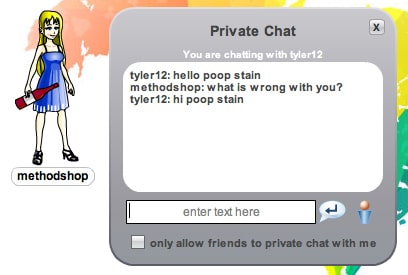
You can also meet on sites and chat with others using your avatar. This is more about social, contextual chatting, then efficient IM communication. We want people to chat about the site itself and the virtual environment. These will be made clearer as the application evolves.
Who came up with the graphic design style of the ROCKETON avatars and virtual goods?
It’s an internal art style we developed in-house that stuck. That said, our art is constantly changing. You’ll see the style evolve. We wanted a realistic style — not too fantasy oriented and not over stylized — although with Flash animation, you have some limitations. Everything looks a bit cartoon-like.

Our goal is to make a style that doesn’t pigeonhole us, which is harder than it seems. We’re focusing now on aging-up the art style to appeal to a broader audience. You’ll see the change over the next month or two.
Speaking of virtual goods, can avatars make money? What’s ROCKETON’s business model?
The business model is the sale of virtual goods. Other business models will likely emerge, including those related to brand participation.
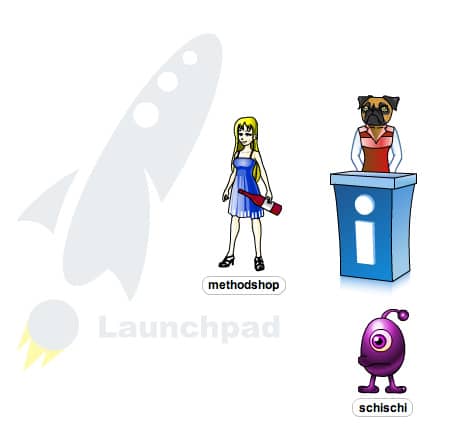
Avatars (i.e. the users) cannot make “real” money right now, however, I wouldn’t rule this out in the future. For now, we make money selling upscale hairdos, costumes, eyelashes, and other virtual goods to our users. We’ll also be bringing in brands, and they will have to pay to build out a virtual world on their web sites.
Would you even sell ROCKETON avatar activity and traffic data to advertisers?
No, we will not be selling activity or traffic data. We may provide aggregate data in a very generalized way to our partners, but we won’t be selling individual data at all.
You’ve scattered virtual items and prizes all over the Internet. For example, Coca-Cola’s website has a vending machine for ROCKETON users that dispenses soda cans users can add to their inventory. Is this vending machine a paid marketing message by Coca-Cola? What other companies have already signed sponsored ‘brand interaction’ deals with ROCKETON?
No. This is not currently paid for by Coca-Cola.
Perhaps one day it will be, as it seems to be effective at getting visitors to their site! For now, we are placing objects around on a variety of sites and encouraging people to discover them.
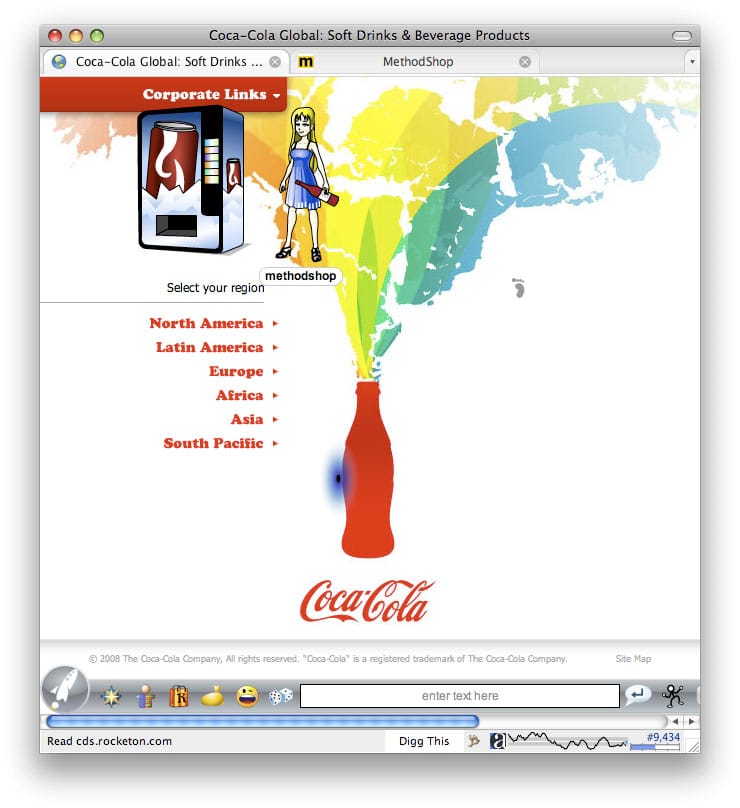
We have a number of deals in the works, but I can’t disclose them until they are completed.
Legally, do you need permission before placing an item on top of someone’s web site? For example, Microsoft would probably get upset if you put an iPhone on the Zune homepage.
If a brand wanted to participate, we would focus their participation on their own site and not on their competitors’ sites. The virtual world layer exists in the browser on the local computer – we are not doing anything to the code that exists on any third-party server or the Web.
In other words, we don’t mess with Microsoft’s web site. It’s all done locally at the end-user’s behest, so we don’t need permission.
There are all sorts of virtual goods in the ROCKETON “My Stuff” folder that can be either purchased with Rocket Dollars or by trading in ROCKETON points that players earn online. Do you have plans to monetize the ROCKETON “My Stuff” folder with sponsored products like Facebook has done with their sponsored gifts?
We are exploring partnerships in which brands would like to have their products or goods included in the world. What is interesting is that if you get, for example, a virtual outfit from the Gap.com and you wear it as you browse, you become a brand ambassador for The Gap. If someone sees your outfit and wants one for of their own, the only way they could get it is to go to the Gap.com. In this way, we’re driving traffic to our partner sites.
One more thing – you can also find virtual goods, like clothing and items, as you passively browse the web. They will automatically get picked up and placed in your My Stuff bag. This is really cool because you can obtain items both actively and without doing anything — just browsing.
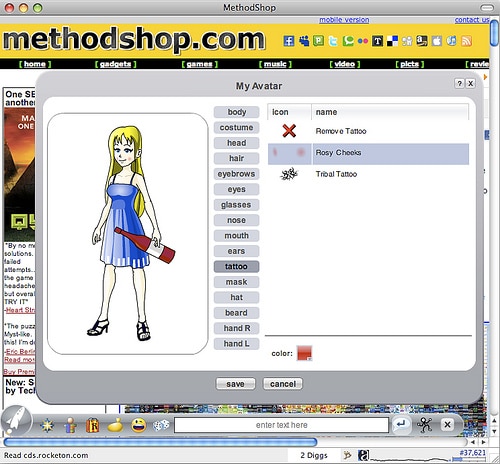
What exactly are “Rocket Dollars”?
We have two forms of currency in ROCKETON – Rocket Points and Rocket Dollars. Rocket Points are earned by using the system – finding and selling items and playing games. We have a large selection of items you can purchase with Rocket Points. Certain items are only available for purchase using Rocket Dollars, which are available through our integrated payment gateway; USD $1 = R$100.
What’s the most popular paid item currently in the ROCKETON store? Most expensive item Points/Rocket Dollars?
Currently, the most popular item seems to be virtual pets. The most expensive item available for Rocket Points is an outfit for 10,000 Rocket Points. The most expensive Rocket Dollar item we currently have are virtual pets at R$180 (i.e. $1.80). Those are subject to change, of course.
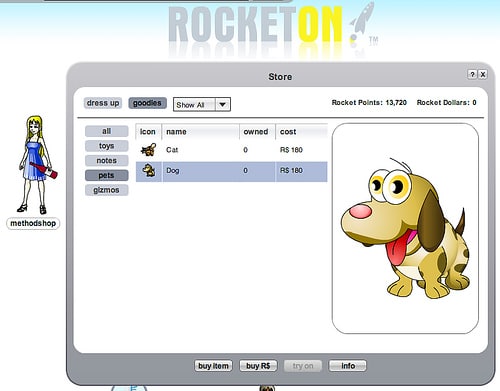
How do you decide on whether or not an item can be purchased with Rocket Dollars or Points?
We have designed an overall world balance and we are working towards that goal as we introduce new items. We want players to be able to both earn really cool items, without spending any real money, as well as purchase different really cool items with their money. A lot of our players will never spend a dime, and we want to ensure that they have a great time.
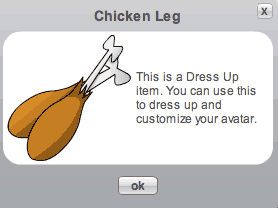
For those users who do spend money, we want to give them special items that you can’t get just by playing for free.
A February 2008 ROCKETON press release announced that investment firm D.E. Shaw had invested $5M into the future of ROCKETON. What other venture capital firms have invested in ROCKETON? Would you ever consider letting your users possibly invest in the company?
Our Series A round was with Bertram Capital, prior to the D.E. Shaw investment. We have not considered users investing in ROCKETON, although that is an interesting idea. I believe there are a number of regulations that make this very difficult in the United States. We’d have to go public before we can really open up ROCKETON to individual investors. To invest in a private company like ours, you have to meet a lot of criteria, which most of our users wouldn’t be able to do.
NERD NOTE: D. E. Shaw & Co. is a New York-based hedge fund, private equity and technology development firm whose activities center on various aspects of the intersection between technology and finance. Based in New York City, New York, it was founded by David E. Shaw, who was formerly a faculty member in the computer science department at Columbia University.
Would you consider creating custom ROCKETON avatars for online celebrities, like Perez Hilton, that they could use on their blogs to interact and chat with their fans?
Absolutely! We think that this is a great way for sites, brands and personalities to provide an engaging virtual world experience for their visitors without the large capital outlays that current incarnations of virtual worlds require. Do you know Perez? Let’s give him a call.

What were some of the big name projects you guys oversaw in your previous roles before co-founding ROCKETON?
ERIC: While at Hasbro Interactive, I managed the casual games group – this was before the phrase casual games commonly existed in the gaming space. It is a category that has come a long way. I worked on properties like Monopoly, Scrabble, The Game of Life – not incredibly sexy compared to the FPS or RTS of the day but commercially successful. We also licensed in casual brands like Wheel of Fortune and Jeopardy. While at VUG, I worked on franchises like Empire Earth, SWAT, Lord of the Realms and NASCAR. Steve and Naomi have even more impressive lineages.
STEVE: I was the co-founder of Zannel, which just won a Webby for its instant mobile media messaging platform. Before that I ran Infospace’s North American Games Group, and before that I was the CEO of Spiderdance, which ran interactive TV shows across the major TV networks, including NBC, Turner, The WB, GSN, History Channel, etc. I’m also passionate about game design. I was the co-author of Game Design Workshop, which is a popular book on game design. Lastly, I’ve done some non-profit work. I was the founder and former Chairman of the Producers Guild San Francisco Chapter, which has grown from a small band of film, TV and interactive producers into thriving organization up here that supports producers by providing health insurance, mentoring, networking and other benefits.

You’ve probably been keeping a close eye on the launch of Justin Hall’s PMOG service. Although both of your products differ greatly, they both are basically Firefox web browser extensions that turn mundane daily web browsing into a multiplayer online game. Is there room for both PMOG and ROCKETON on the Internet?
We think so. We believe that there will be multiple companies carving out their own niches and going off in their own creative directions. And for the sake of clarity, we work in Internet Explorer as well.
Last month my browser almost had a heart attack when I found myself playing PMOG, ROCKETON and engaged in Balloonacy, Orange’s Internet balloon race, all at the same time. Is there enough room on the average computer monitor for ROCKETON and your competitors?
For the same reason you would not (I assume) run multiple online games at one time, you might want to be selective in the products you have cohabitating in your browser. We make it easy to turn ROCKETON on and off – it’s a simple mouse click.
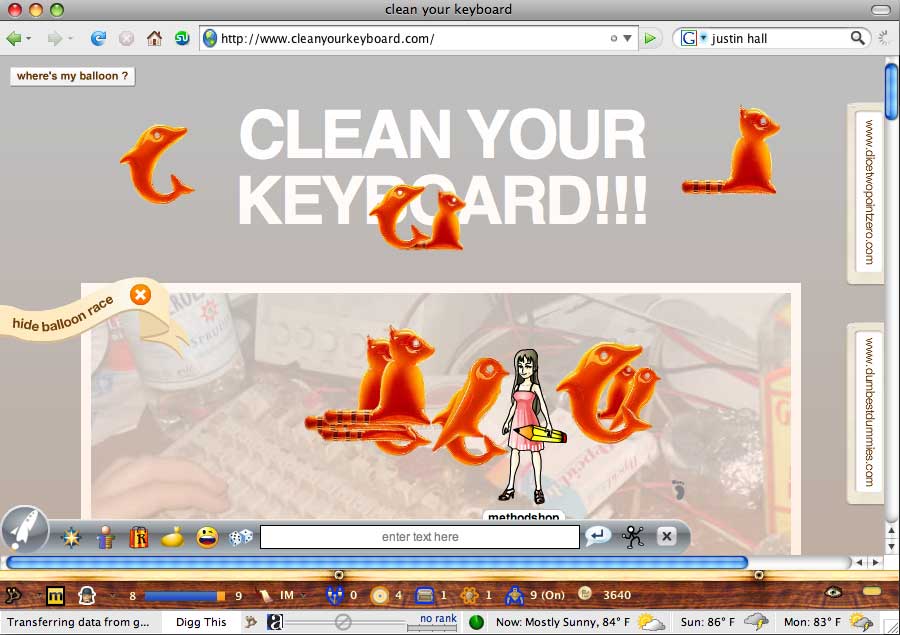
When describing ROCKETON to my coworkers, the phrase “Second Life killer” came up several times. What’s your initial reaction when you hear someone describe ROCKETON as a “Second Life killer”?
We have nothing but respect for Second Life. They have an incredible platform that is widely accepted and is the high-bar in the virtual world space. We don’t get bogged down with extreme-thinking – its way more productive for us to focus on creating a fun experience within our world and we’ll see where we end up. I personally think people will use both ROCKETON and Second Life, but for different reasons. Ours is a much lighter, more casual experience, and I think we’ll gain a broader audience; an audience who doesn’t want to invest the time into a deep experience like Second Life.
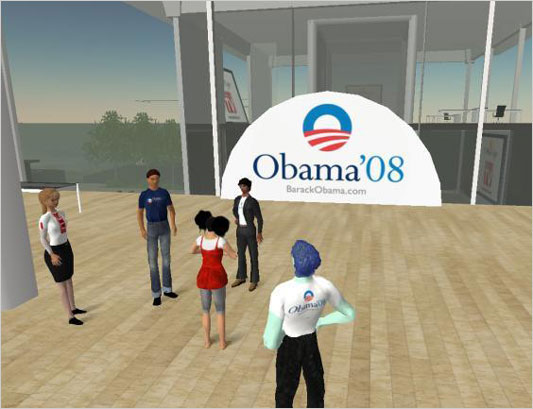
NERD NOTE: Second Life is an Internet-based virtual world video game developed by Linden Research, Inc (commonly referred to as Linden Lab). Second Life launched on launched on June 23, 2003.
When PMOG first launched, it was plagued by users of click-spam sites like MyMiniCity. What precautions has ROCKETON taken to protect itself from users trying to abuse the system?
Users will always try to find ways to abuse the system and we spend inordinate amounts of time and resources on abuse mitigation. We have built in many precautions and safeguards.
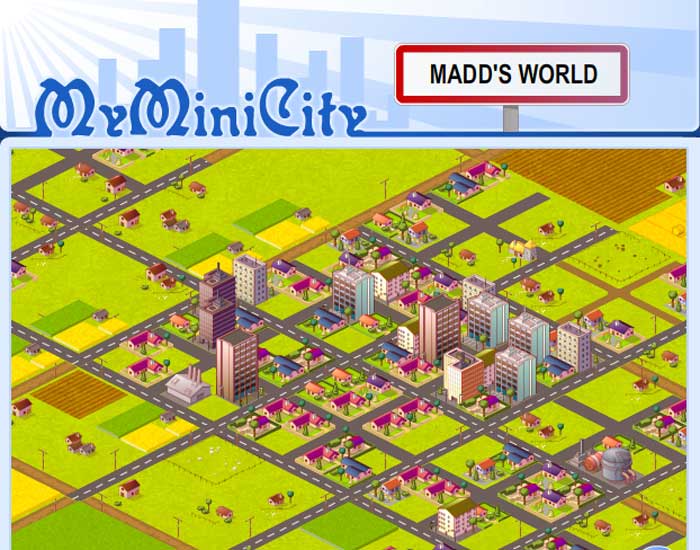
Ultimately, if someone can hack the DOD and the White House web site (whitehouse.gov), they can probably break into any site out there. That said, our lead server engineer is obsessed with security. So I think we’re in pretty good shape to do battle with the hackers and spammers.
Once a user has a ROCKETON avatar, their avatar can do a variety of things online with other avatars including play games, chat, travel to other web sites or even go on a date. Are you worried about things like adults trying to lure younger players to porn sites or pedophiles engaging in private sexual chats with underage ROCKETON users?
This is always a concern. Users must be 13 or over to enter our world. We put in many controls into our system to protect all of our users. Additionally, our application resides in the browser so URL destinations will be limited to whatever parental controls are installed in the system (CyberSitter, NetNanny, etc).
We take protecting our users seriously. We have designed the ROCKETON virtual world to be safe, secure and meet all Federal and local regulations. Here’s a list of all the security measures, rules and policies that we have put in place to protect our users.

Our reputation depends on providing a safe and secure environment for all of our users, and we will continue to develop new technologies and implement new security measures as they become available.
Let’s talk about the future of ROCKETON. We noticed that ROCKETON doesn’t even have a Wikipedia page yet. Is that still on your ‘to do list’? I know you’re a young company and all, but you’ve already gotten your TechCrunch mention.
There are so many things on our to-do list! I’m sure Wikipedia is there, somewhere.
Sometimes success can be a double-edged sword. Twitter for example goes down so often that someone created a web site calledIsTwitterDown.com. PMOG also frequently goes down as they continue to scale up their servers. Do you have a plan to try to maximize your uptime with ROCKETON after the site comes out of beta?
We have built ROCKETON from the ground up to be a scalable architecture and we’ve stress tested all of our components along the way. We’ve also had closed alpha testing going on for some time, which has helps us discover weaknesses and pinch-points. We feel confident that it will scale up gracefully.
Does ROCKETON have a limit on how many users are displayed per page? For example, what happens if Apple announces a new iPhone and 500k ROCKETON users all visit Apple.com at the exact same time? Will avatars for all 500k users be on the same page at the same time? That might make it hard to read anything on the screen.

We have a mechanism that automatically manages individual room capacity. When a room reaches capacity, a new entrant to the room would enter into a newly spawned room.
So, to use your example, there may be many rooms that are mapped to the apple.com site, each of which contains a manageable number of users.
Are there any plans to open up the ROCKETON API like Facebook did and allow 3rd party developers to create interactive elements like the Coca-Cola vending machine?
Yes, we do have plans to make certain aspect of our system available to 3rd parties and partners. We are still busy creating our core, but this is definitely on our roadmap.
Have you thought about taking ROCKETON beyond being just a browser plug-in? Maybe make a ROCKETON Facebook app or a desktop widget?
We actually did some early widget testing. We do plan on a widget and even a mobile app – however, like all other “nice to haves” we will stay focused on our core development for now.
Right now (June/July 2008) ROCKETON is still in closed alpha. When do you expect to launch the service to the general public?
We do not have a definitive launch date; however we envision a launch soon. Our goal is to perfect the app before we open it up. As Orson Wells says, “We will drink no wine before it’s time!”
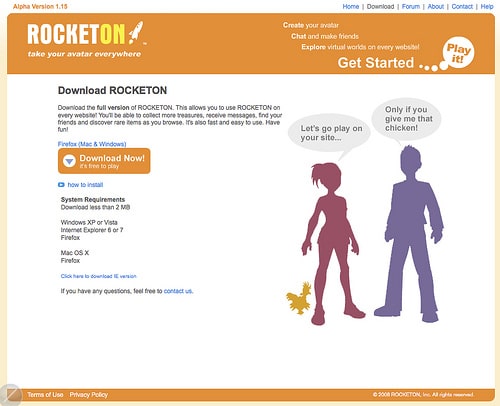
If someone is reading this right now and not already registered on ROCKETON, what message would you want to leave them with? Why should they join the ROCKETON community?
ROCKETON is a social browsing experience filled with fun and discovery. You can see others online, chat, play games, watch videos and travel the web together. Plus, we have a chicken in a bucket. And come on, where else can you get virtual tap-dancing roaches just by going to blackflag.com?
Thanks for interviewing us – it was fun!

Frank Wilson is a retired teacher with over 30 years of combined experience in the education, small business technology, and real estate business. He now blogs as a hobby and spends most days tinkering with old computers. Wilson is passionate about tech, enjoys fishing, and loves drinking beer.

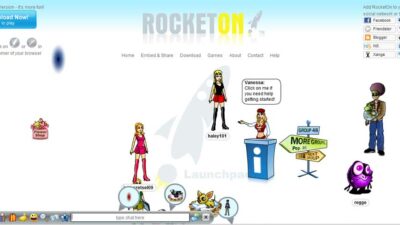





















Leave a Reply
You must be logged in to post a comment.